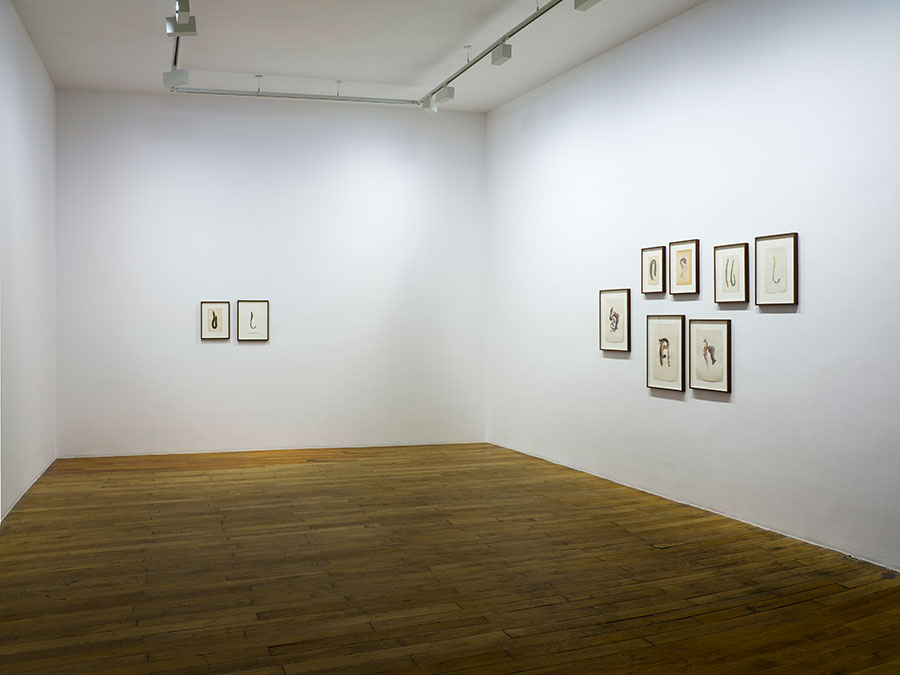Anri Sala: Pushing Against the Boundaries
The artist’s exhibition at Galerie Chantal Crousel, Paris, ‘If and Only If’, inserts ‘an act of magic’ into the assembly line
The artist’s exhibition at Galerie Chantal Crousel, Paris, ‘If and Only If’, inserts ‘an act of magic’ into the assembly line

Shattering glass and the strains of Igor Stravinsky’s Elegy for Solo Viola (1944) weave together at the entrance to Anri Sala’s exhibition ‘If and Only If’. The sounds emanate from an installation of two looping, single-channel videos, Slip of the Line and If and Only If (both 2018). The films are accompanied by ‘Untitled Series (Maps/Species)’ (2018), a group of drawings of eels, maps of countries and artifacts of magic. ‘I had this idea for a lm, of inserting an act of magic in the assembly line’, Sala explained to me. The subtle provocations are inflected with a rare lightness; If and Only If celebrates the conditional, through improvisation.
Slip of the Line comprises a series of tight frames documenting the creation of a wine glass, from glowing molten orb to gleaming vessel. The repetitive process is mesmerizing until the moment a slender, ponytailed man silently picks up one of the glasses and, deep in concentration, runs his fingers back and forth over the stem. He appears to listen intently with his fingertips when, with one swift movement, he bends the glass without breaking it and places it back on the production line. The suspicious object is returned trans- formed to its position in the manufacturing parade. The magician appears to levitate for a moment.

Meanwhile, in another room, a piece of music is being elongated. In If and Only If,
the renowned violist Gérard Causeé plays Stravinsky’s elegy, but slows it down in order to accommodate a snail crawling along his bow. The music ends only when the snail arrives at the bowhead, at which point another one appears – in an apparent nod to the repetition of the assembly line. There is poetry in the playfulness of it all, and magic, too. Violinist and magician seem to mirror one another, whether holding a note longer with a bow or coercing the atoms of a glass.
Both films prompt a double take. The three bent-stem glasses from Slip of the Line are affixed to plinths by a single nail next to the films, as if to reassure us that they are real. Although delicate, they are the hardy members of a tiny revolution that have survived, unshattered. ‘They’re free,’ Sala tells me.
Beyond the glass sculptures hang a group of framed drawings of maps – of countries including Chile, Croatia, Italy and Panama – that have been reimagined and reconfigured to t the confines of a picture frame; they accompany diagrams of eels. The anguilloformed maps recall the bending the glasses have undergone in Slip of the Line, and the elongated forms of the eels correspond to the extended phrasing of the music. Neither maps nor glasses now serve their original function but, rather, seem to push against the boundaries that enclose them.

Sala’s work for the 55th Venice Biennale, Ravel Ravel Unravel (2013), featured two performances of Maurice Ravel’s Concerto for the Left Hand (1930): a piece commissioned by the Austrian pianist Paul Wittgenstein after he lost his right arm during World War I. Included in the show’s accompanying catalogue was Wittgenstein’s letter to Ravel, in which he insists he will perform the concerto his own way or not at all. Foregrounding the artist’s right to interpretation, Wittgenstein underscores how an individual’s version of an original is ultimately a thing of beauty and value. The spirit of that letter finds its realization in this latest suite of Sala’s work.
Anri Sala, ‘If and Only If’ runs at Galerie Chantal Crousel, Paris, until 24 November 2018.
Main image: Anri Sala, If and Only If, 2018, exhibition view. Courtesy: the artist and Galerie Chantal Crousel, Paris; photograph: Florian Kleinefenn © Anri Sala / ADAGP, Paris (2018)























